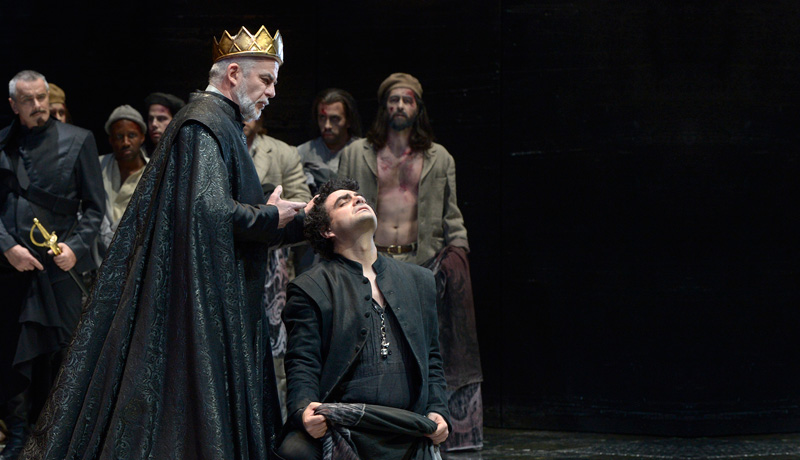Familientherapie mit Verdi - Deutsche Oper Berlin
Verdi’s families on the therapist’s couch
AIDA, DON CARLO, NABUCCO and LES VÊPRES SICILIENNES. Verdi’s operas are packed with complex father figures and children with associated psychological issues. High time for an appointment with the shrink.
Nabucco
Nabucco (ca 50 years of age), Fenena (ca 25), Abigaille (ca 30)
Reason for referral Dysfunctional family dynamics, rivalry between sisters, paternal role unclear, conflicts of identity
Anamnesis Father and daughter enter practice – and all hell breaks loose. Abigaille the loudest, Fenena reserved, Nabucco seems surprised to be here (»I’m King of Babylon. Don’t need a shrink!«) Abigaille contradicts him: »He’s not a real king – and I’m not even his real daughter!« Fenena sighs. A pattern emerging, driven by family dynamics: Nabucco is biased towards his biological daughter, Fenena; Abigaille, the adopted daughter, wants equal treatment from him and becomes aggressive and destructive.
A gathering musical backdrop, drastic in nature, reflects the huge lack of trust and a desire to be loved. Fenena’s solos are mellifluous and cantabile; Abigaille’s have a spasmodic, almost manic forward impetus, filled with punchy coloraturas. Nabucco himself swings between a sense of superiority and utter disorientation, with his mood changes mirrored in the music.
Diagnosis
— ICD-10: Z63.8 (family dysfunction), F60.3 (emotionally unstable personality disorder, Abigaille), narcissistic wound, Nabucco
Therapy programme / objectives
— Reduce competitiveness between sisters; reflect Nabucco’s shifting grasp of his role as father and ruler
Prognosis Challenging. Fenena may stabilise if she can distance herself from family strife. Abigaille displays highly destructive tendency, would probably respond positively to therapy – assuming she does not burn Babylon down in the meantime. Therapy for Nabucco dependent on successful analysis of his acute delusions.

Don Carlo
King Philip II (ca 50), Don Carlo (ca 25)
Reason for referral Aggravated father-son conflict, impaired communication, lack of trust, rivalry, jealousy
Anamnesis Philip attends therapy session with son, Don Carlo, who is clearly not here of own free will (»Bollocks to this! It’s not a shrink we need but an unambiguous line of succession!«). Father appears dominant, distant. Son seems very insecure, shows signs of affective lability. At the core is their rivalry for the favours of Elisabeth, Carlo’s former fiancée and now Philip’s wife. It soon becomes clear that the antagonistic relations between father and son were accentuated by the music: Philip’s deep bass (dark, solemn, almost unmoving) is set against the impulsive, feverish singing of his son, whose mood switches constantly between revolt and resignation.
Diagnosis
— ICD-10: F60.7 (dependent personality disorder, Don Carlo), Z73.1 (burnout, Philipp II)
Therapy programme / objectives
— Address dysfunctional pattern of relationship; reduce feelings of rivalry; establish emotional boundaries
Prognosis Critical. Both clients cling stubbornly to respective position. Philip II will not see reason (»I don’t have to change a thing! I’m the King!«). Don Carlo is defensive at first, then shows a slight willingness to change, but is still emotionally unstable. Could make progress – as long as a halt is called to further executions.

Aida
Aida, ca 20
Reason for referral Stress response to a serious conflict of loyalties involving close family and significant others
Anamnesis Client herself sought therapeutic help. Joint session not viable as father is against all forms of therapy. Client reports emotional stress, inner turmoil and an inability to ascertain and articulate what she wants. Strong sense that she lacks autonomy. Conflict between loyalty to her father, Amonasro, and love for Radamès, an Egyptian captain and the biggest foe of her father, is acute and ongoing.
The music conveying her inner conflict is remarkable, shifting between soft, plaintive cantilenas reflecting her turmoil and sudden breaks in her voice when she’s quoting her father, which is when her voice acquires an edge and she talks in the terse, clipped phrases of the military.
Diagnosis
— ICD-10: F43.2 – adjustment disorder with marked conflict of loyalties, inability to set boundaries between self and authorities
Therapy programme / objectives
— Coach the client in differentiating between other people’s expectations and own needs; help build a strong sense of self; reduce dysfunctional feelings of guilt
Prognosis Client is skilled at reflecting but seems very inclined towards self-abandonment. Success will hinge on whether she can drop the idea that she can find a decision that is »right« for everyone.

Les Vêpres Siciliennes
Guy de Montfort (ca 50), Henri (ca 25)
Reason for referral Huge father/son estrangement, unresolved trauma, identity conflict owing to late disclosure of paternity
Anamnesis Clients attend in joint session, albeit with very different motives. Montfort calm and collected. Henri’s defences are up, he avoids eye contact at first, is in denial of blood link (»I’m not his son«). Background: Henri grew up ignorant of his origins, discovers in adulthood that his worst enemy, the governor of the French occupying forces, is his father. Since then, feels rage, loathing and uncertainty in equal measure.
The gulf between the two men is reflected in the music. Montfort pushes for reconciliation in his controlled, legato-led singing while Henri opposes this with his spasmodic, agitated utterances. Their duets are not dialogues but duels between different vocal approaches. The orchestra heightens the conflict: Montfort’s phrases are buttressed by soaring chords from the wind section, while Henri’s singing is set to uneasy strings – music for a son who has nothing to anchor him.
Diagnosis
— ICD-10: F43.1 (post-traumatic stress disorder, Henri), F60.2 (dissocial personality disorder, emotional distance, Guy de Montfort)
Therapy programme / objectives
— Validation for Henri in his conflict of identity without enforced proximity to father; facilitate a change of perspective on both sides
Prognosis Therapy is hindered by father’s rigid attachment pattern and Henri’s deep-seated rejection of him. Full reconciliation unlikely but a working relation accompanied by ongoing therapy possible. At time of writing: hackles up, both highly sensitive, high level of reactance. Further sessions needed.





